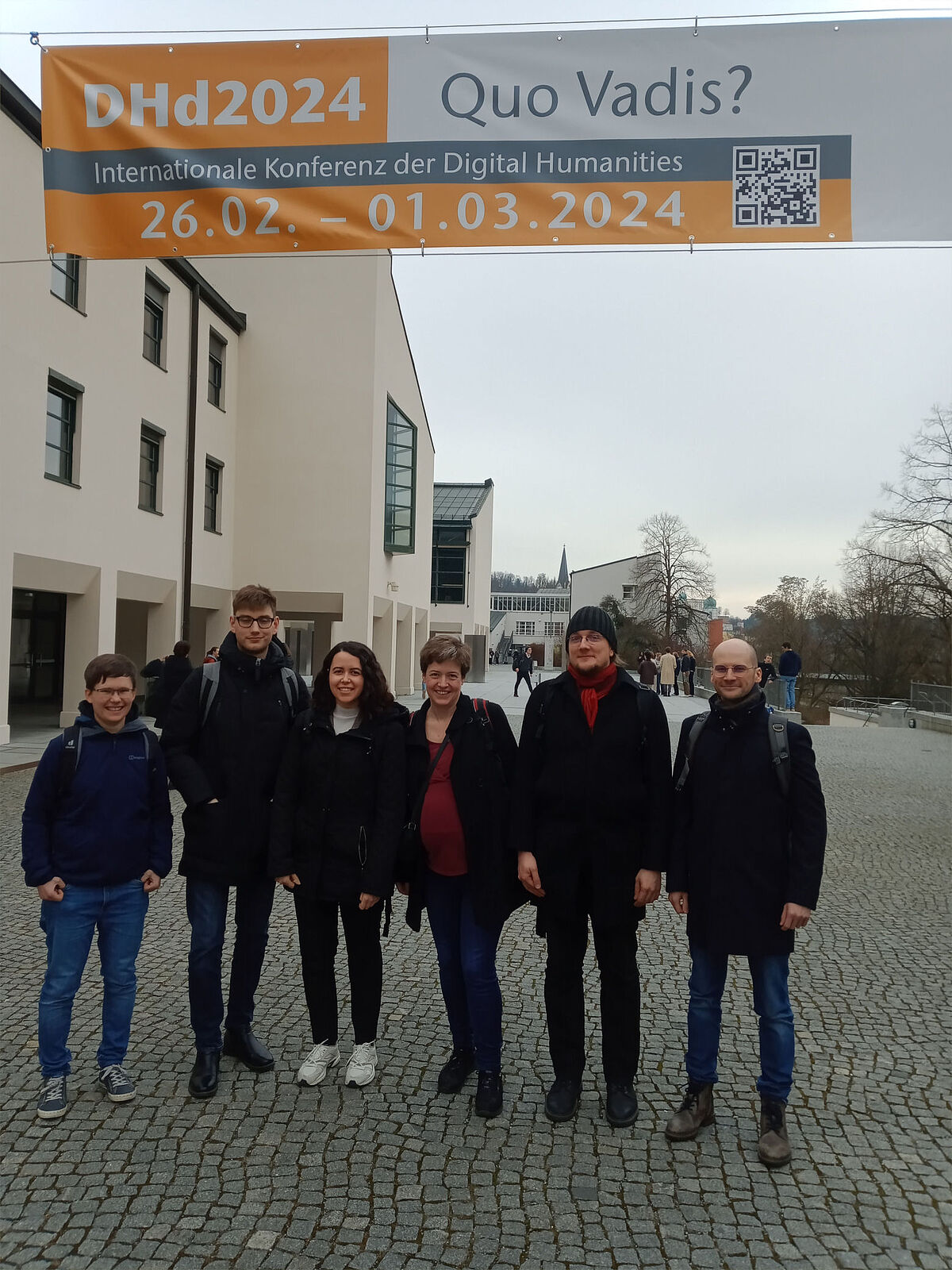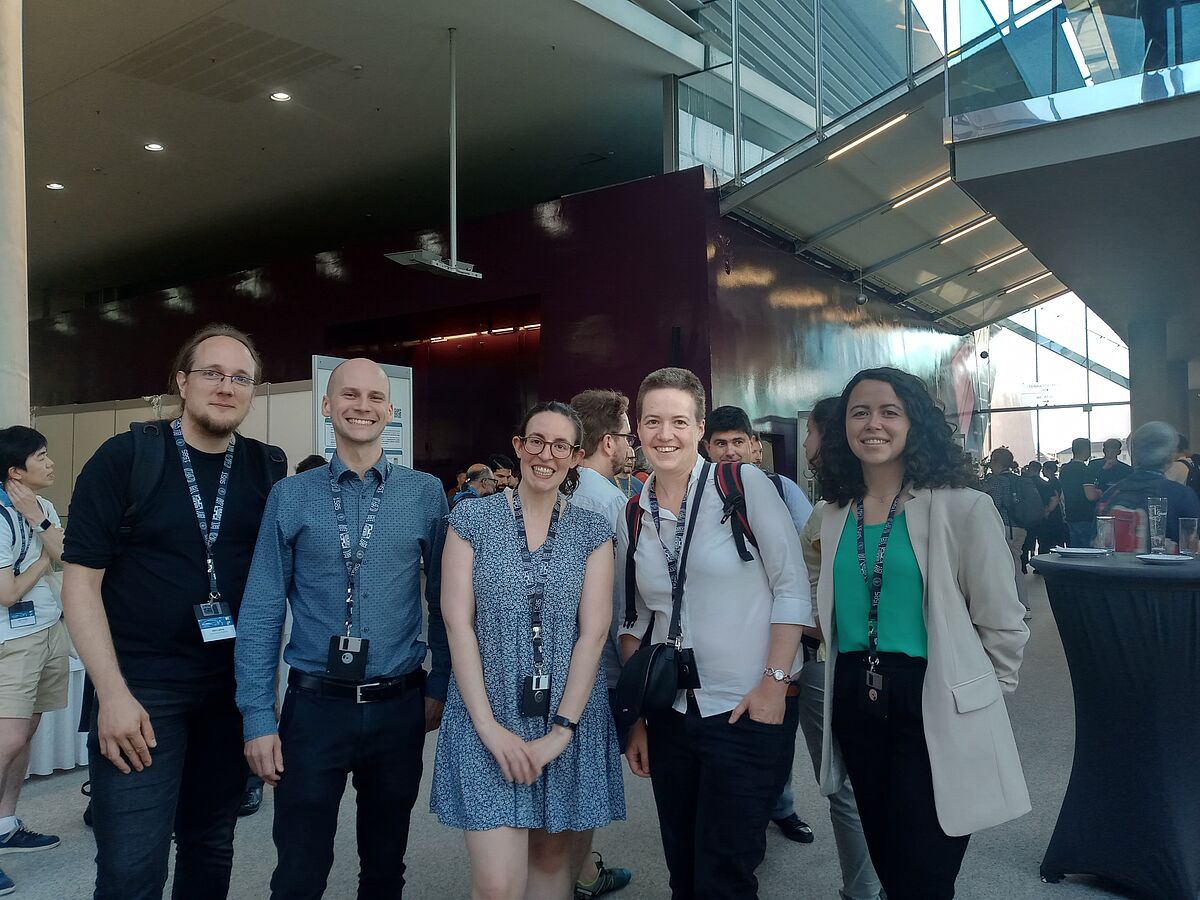News
26.2.-1.3.2024: Conference "DHd 2024: Quo vadis DH? (DHd2024)" in Passau

It is now ten years since the representatives of the Association of Digital Humanities in German-speaking countries gathered for the first time in Passau for the conference, which now takes place annually at different locations in Germany and other German-speaking countries. After a decade, DHd2024 now offers the opportunity to take stock and develop future perspectives within the discipline. Not only has the community grown steadily over the last ten years, but the fields of research and applications of the digital humanities have also changed and developed. Digital ways of working and methods have arrived in everyday research and in all areas of life; digitalization has become part of the public discourse, think of artificial intelligence or big data, for example. DHs have therefore always been faced with the task of accompanying this process and playing a decisive role in it, especially when it comes to formulating offers of interpretation and assistance.
The question therefore arises: How can the digital humanities meet the growing demands - for example in the areas of sustainability, ethics and data protection, interdisciplinary collaboration and data-intensive research? How will the DH develop over the next ten years? What current and future challenges will DH have to face? Which methods should be pursued further and which should be reconsidered?
(translated and cited after: https://web.archive.org/web/20240226103915/https://dhd2024.dig-hum.de/call-for-papers/)
As part of the conference, we will present the progress of the project and in particular the annotation guideline CANSpiN.CS1 in a poster contribution.
1.2.2024: Workshop "Von Ort zu Ort: Digitales Edieren von Reisenarrativen – Neue Perspektiven" in Regensburg
As part of the workshop "Von Ort zu Ort: Digitales Edieren von Reisenarrativen – Neue Perspektiven", we will present the annotation guideline CANSpiN.CS1 to a professional audience for the first time. The event will take place on 1 and 2 February 2024 at the Leibniz Institute for East and Southeast European Studies (IOS) in Regensburg and is organized by the team of the DFG project "DEHisRe" (Digitale Editionen Historischer Reiseberichte).
The presentations and discussions at the workshop will focus on the role of annotations as orientation aids in the complex landscape of digital information:
- Advanced approaches to text encoding with TEI: We would like to talk about new modules and customizations in TEI that enable finer granularity and specificity for the digital edition of historical travelogues.
- Innovative data modeling and Linked Open Data (LOD): How can we use LOD to make our digital editions even more connected and accessible? We are particularly interested in examples that show how travelogues can be integrated into larger data ecosystems.
- Interactive visualizations and user engagement: Going beyond the current state of the art, we would like to discuss methods that allow users to be actively involved in the exploration and analysis of travelogues. What role do interactive maps, timelines and other visual tools play?
- Machine learning in editorial studies: How can current technologies help to facilitate our work and generate new research questions?
(quoted and translated from: https://web.archive.org/web/20240205131852/https://dehisre.ios-regensburg.de/workshop-von-ort-zu-ort-digitales-edieren-von-reisenarrativen-neue-perspektiven/)
6.11.2023: Presentation of the CANSpiN project at the lecture series "Digital Humanities in Focus: Methods, Applications and Perspectives" in Rostock
In the winter semester 2023/24, the Rostock Working Group Digital Humanities (RosDH), in collaboration with the Junior Professorship for Digital Humanities and the IuK Network, once again invites you to the lecture series "Digital Humanities in Focus: Methods, Applications and Perspectives". Here, expert knowledge on the latest developments and applications in the field of digital humanities will be presented by representatives from the University of Rostock as well as invited guests from the German-speaking and international community.
On Nov. 6, we will present our talk "Zur Annotation und automatisierten Erkennung von Raum in Romanen. Ein Werkstattbericht des Projekts CANSpiN", in which we will discuss the CANSpiN project and its current status.
Access: University Main Building, Room 104, Universitätsplatz 1, 18055 Rostock (1st floor) and online via Zoom (Passcode: 430211).
25.-26.9.2023: Workshop "Large Language Models mit PyTorch" in Rostock
The joint workshop Large Language Models with PyTorch of the Department WKT (priority programme Digital Hermeneutics) and the cross-sectional topic Computational Analytics at the Interdisciplinary Faculty of the University of Rostock offers participants the opportunity to learn how to use Large Language Models for different tasks of Natural Language Processing in practice. The event is organized by the members of the CANSpiN project group Tobias Strauß, Ulrike Henny-Krahmer and Marc Lemke.
10.-14.7.2023: Conference "DH 2023: Collaboration as Opportunity" in Graz

The annual ADHO Digital Humanities Conference is the central and largest event of the international DH community and unites scholars from across the globe, presenting them with a unique opportunity for the exchange of their work and ideas and the fostering of future collaborations.
This year’s conference theme “Collaboration as Opportunity” showcases transdisciplinary and transnational collaboration, with a special focus on the thriving South-Eastern European Digital Humanities community. It will explore how mutual empowerment and collaboration of neighboring countries – regardless of continent and geopolitical placement – can transform regional hubs of expertise to international networks of excellent research, to the benefit of the global DH community.
(cited after: https://dh2023.adho.org/)
The DH2023 conference gives us the opportunity to engage with partners from around the world on topics of interest to us in the project, such as corpus building, data modeling, annotation, extraction from unstructured data, and large language models.
28.6.2023: Workshop "Computational Analytics" in Rostock
Tobias Strauß, member of the CANSpiN project group, offers with the workshop "Computational Analytics" the opportunity for networking of researchers related to the topic of AI. In this context, we will present the goals and technical challenges of the CANSpiN project and discuss them with the participants. The workshop is offered by the Interdisciplinary Faculty of the University of Rostock.
25.4.2023: Kickoff-Meeting in Rostock
On April 25, the kickoff meeting of the project will take place with all participants of the three work packages. Objectives, strategies and open questions will be discussed as well as communication channels and best practices.
20.-21.4.2023: Conference "Comparing Landscapes: Approaches to Space and Affect in Literary Fiction" in Bielefeld
The Collaborative Research Center 1288 "Practices of Comparison" (Bielefeld University), in collaboration with the Faculty of Linguistics and Literary Studies (Bielefeld University) and the Swiss National Science Foundation, invites proposals for papers for the interdisciplinary conference "Comparing Landscapes: Approaches to Space and Affect in Literary Fiction". The conference will take place at the ZiF Bielefeld on April 20 and 21, 2023.
We are very pleased to welcome Prof. Caroline Bassett (University of Cambridge), Prof. Alexander Honold (University of Basel), Jun.-Prof. Mareike Schumacher (University of Regensburg) and Prof. Matthew Wilkens (Cornell University) as keynote speakers already! [...]
This conference brings together scholars from literary studies and the digital humanities to explore representations of space and affect in literature and literary history, focusing on two aspects: the 'national' as a dimension of reference and the role of practices of comparison.
The conference is designed to welcome a wide range of perspectives: from literary criticism to machine learning, from geospatial to sentiment analysis, from metaphor theory to historiography.
Our goal is to create an interdisciplinary event in which research on the dimensions of space and affect in literary texts is explored with reference to "national literatures" and practices of comparison at different levels. This exchange of ideas will take place among scholars from different faculties and backgrounds who share an interest in the ways in which space and affect inform literary discourse and literary historiography.
We look forward to a series of exciting presentations comparing dimensions of space and affect in different national literatures and periods. We invite contributor:s from a variety of research traditions and disciplines, including but by no means limited to hermeneutics, philology, cultural studies, cognitive poetics, empirical literary studies, corpus stylistics, and all kinds of data-driven and digital humanities.
(translated and cited after: https://comparing-landscapes.github.io)
In the context of the planned poster session we will present the CANSpiN project to the conference participants. See the publications.
20.-21.2.2023: SPP-Meeting in Göttingen
For the DFG Priority Program "Computational Literary Studies" the first funding phase ends in 2023. Therefore, a final meeting will take place on 20-21.02.2023 at the Historische Sternwarte Göttingen. During this meeting, the individual research projects of the first funding phase will present what they have achieved during the period and, if applicable, what they are planning for the second funding phase.
Here we have the opportunity to present the CANSpiN project publicly for the first time and to help shape the future collaboration between the projects within the priority program.

